How did you hear about cell ag? What’s your journey been?
Surprisingly, it’s a pretty long story. It dates back to 2009 when I was an undergrad at the University of Alberta, where Isha also did her first degree. While we didn’t know each other personally back then, I went to see her present on the possibilities of in vitro meat. I was absolutely captivated by the promise of the field and have been following the advances ever since. Ultimately, the more I learned about it over the years, the more compelling it was as one possible solution to a number of global challenges that I’m really invested in –– like the climate crisis and global hunger.
What were you doing before you came to New Harvest?
I was working in fundraising communications at my alma mater, the U of A. Part of my job was writing for the alumni magazine, where we would tell the stories of the amazing achievements of grads – and of course Isha is one of them. About a year ago, I pitched this idea of doing an editorial feature on the future of food. At that point I came across an interview with Isha on the future of milk. I took it as a sign to reach out and ask her how I could get involved with New Harvest. Lo and behold, she had just relocated her family back to Canada when COVID hit and had transitioned the team to be completely remote-forward. Lucky for me, she just happened to be looking for someone to support the org’s development goals. And the rest is history!
You mentioned the future of food editorial you worked on, tell me a bit more about that.
I had envisioned that one section would focus on the cellular level of the future of food. The idea was to look at how we might build a better cow. There are U of A researchers and grads working on two main approaches to combating the negative effects of animal agriculture: one – cellular agriculture – more innovative, and the other – genomics and adjusting the traits in a cow – more working within the traditional agrifood world.
Did the research for that editorial change your views on farming or cell ag at all?
As I was doing the research amidst the global pandemic, I was once again confronted with how irredeemably broken our global food system. It’s just so clear to me that we need to effectively reinvent the wheel. There’s that famous image of chickens compared over the decades and how we have maximized the yield. Now we see these giant chickens with huge breasts, to the point where the chicken can hardly keep itself upright. We’ve come as far as we can with the animal bioreactors, and now it’s time to think beyond the animal.
How do you see New Harvest helping that problem?
One of the things that I really appreciate about New Harvest is that not only is it a mission driven organization, but it has a really strong sense of its values. The team has really clearly articulated that the ends don’t justify the means – that is to say, that the way in which we get to our goal of maximizing the positive impact of cellular agriculture is just as important as getting there. I think a lot of organizations overlook the importance of the path while focusing on the destination. One of the things that I really appreciate about the work culture is that it’s really inclusive and nonhierarchical and values diversity of thought and expertise; New Harvest is sort of modeling the world that we hope to create.
How do you see yourself driving towards that mission?
I hope to contribute through strengthening and expanding the generosity network. When I first reached out to Isha, it was really just to chat about New Harvest; this was before the job was even posted. I told her a little bit about my background, and how I was really values-driven and interested in relationship building. That really seemed to gel nicely with her vision when it comes to development and advancement work. We really connected over this idea of the generosity network, which is an idea that seems really intuitive when you talk about it, but is actually a huge departure from the way in which fundraising happens in the more conventional or traditional nonprofit world.
How does the generosity network work?
The generosity network is this idea that as opposed to there being an asker and a giver – a fundraiser and a donor – it’s more about creating a collaborative, mutually beneficial community. It’s not about just dollars raised, it’s about creating and forging meaningful, transformative partnerships. I see my role at New Harvest really being about growing that network.
How does the generosity network look so far?
One of the things that’s immediately clear is that New Harvest already has an amazing, committed and engaged group of donors and supporters. And I think just because of capacity we haven’t been able to engage those community members as well as we wished we could have. My job will be to really get to know our network, and, as much as possible, create those one-on-one connections to see how we can best serve that community. One of my top priorities will be to really highlight the ripple effect of our fellowship program and show our community members the impact of their support. This will involve telling those research stories and really capturing how their support is making a difference in advancing the field of cellular agriculture.
Were you always planning on doing fundraising in this way?
I actually never thought I was going to go into fundraising. When I started in communications, I thought fundraising was about salesmanship and that was not what I was about. I really value authenticity and connecting with people, and before I got into fundraising, I always thought it was just about selling people a product. But as I learned more about effective fundraising, I discovered it’s more about mutual transformation. It’s really about really connecting with people and getting to know what drives them, how they want to make a difference, and then connecting them with a cause that really matters to them.
Who do you think makes a good match for donating to New Harvest?
The work that New Harvest does by funding open research in cellular agriculture touches on so many different causes. Our donors care about everything from animal welfare to mitigating the effects of the climate crisis, from tackling global hunger to trying to avoid antibiotic resistance. The list goes on! But ultimately I think the common denominator that unifies all of our various supporters is the strong belief in the long-term societal benefits of open science and basic research. So, New Harvest is a good fit for donors who are really invested in the sustainability of the field. As we all know, cell ag research tends to fall through the cracks of more traditional public funding models. So, we need to support scientists and researchers who can be leaders in the field and ensure its viability long term.
If you could try any cell ag product, what would it be and why?
I just want to try them all! But if I had to choose just one product, I think it would probably be milk. I am weirdly nostalgic about milk. It’s something that I used to really enjoy because I grew up with it – you know, a big glass of milk with dinner – and nothing really replaces that. I’ve tried all of the milk alternatives, and they haven’t fully met that nostalgia factor. I’m an avid coffee drinker who likes cream, but the replacements just fall short. I’m also an ice cream fanatic… so maybe it’s the continuum of milk-based products I’m excited about trying!



